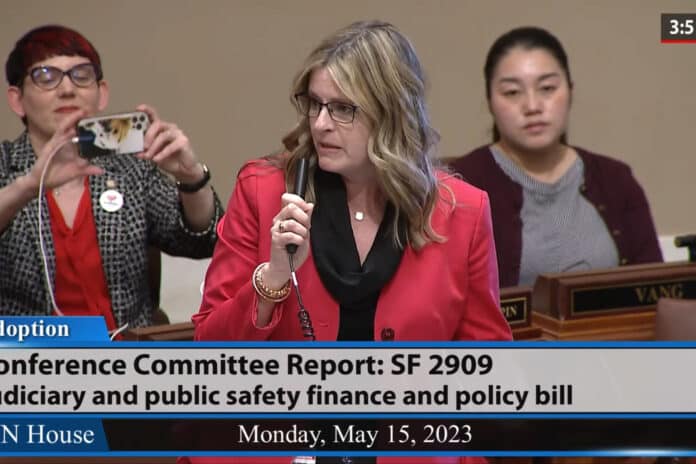
The days and hours the Minnesota Legislature has left to wrap up its work are dwindling. A midnight deadline on Monday, May 22 looms and several major spending and policy bills are working their way through conference committees — including an $880 million public safety and judiciary finance and policy bill that includes two new gun control provisions that were added by conferees last week.
On Monday night the House DFL majority voted 69-63 to adopt the conference committee report for SF2909. One Democrat, Rep. Dave Lislegard from Aurora, voted against it. That comes after the Senate voted 34-33 on Friday to adopt the report, which also includes controversial language surrounding a Human Rights statute, a provision that gives prosecutors the ability to decrease a judge’s sentence, and the creation of an Office for Restorative Justice.
House DFL leaders are doubling down on their promises in recent weeks to finish their work by Thursday, May 18. But Republicans say ending the session four days early will shortchange the public as several omnibus bill conference reports are being agreed upon outside of those committees and are being rushed to the House and Senate floors before all legislators have enough time to vet them.
“We have days left in this legislative session and the public deserves to hear what is being talked about, what is going to potentially become law,” House Minority Leader Lisa Demuth, R-Cold Spring, told media on Friday. “When we were not given conferee positions on every conference committee (including on SF2909), there is no way we are going to be suspending the rules and get [conference reports] through faster.”
Following that press conference, Republicans and Democratic leaders on the House floor broke out into an argument regarding procedural timing of another conference report (the early childhood learning bill) GOP legislators claimed their DFL colleagues rushed through without giving them time to properly vet the bill. One legislator, Rep. Ann Neu Brindley, R-North Branch, even called Speaker Melissa Hortman out on the House floor for her admission to the public late last week that she would be able to make a weekend college reunion at Harvard University if the legislature wrapped up by its self-imposed May 18 deadline.
That prompted Hortman to chastise and threaten Republican legislators with parliamentary procedure-related punishments.
“We can take the approach to rule every single member of the House Republican caucus that engages in dilatory behavior out of order and then proceed,” Hortman said.
Following that verbal exchange, Democrats voted to recess until Monday morning. The House eventually passed the conference reports on the early childhood learning and public safety and judiciary omnibus bills largely along party lines on Monday. SF2909 is now headed to the desk of Gov. Tim Walz.
What’s in SF2909?
Universal background check and ‘red flag’ on firearms
- The universal background check and Extreme Risk Protection Order (ERPO) provisions were added by the conference committee, which includes no Republicans from either the House or Senate. Those provisions were not included in the original Senate version of SF2909. The conferees adopted the House language that included both provisions, but modified it slightly to align with Senate Democrats’ positions. The provisions would create criminal background checks for private party transfers of pistols and semiautomatic firearms. The bill wouldn’t apply to most hunting rifles. The ERPO provision, considered a “red flag” law, would establish a procedure under which family or household members or a chief law enforcement officer can petition for an extreme risk protection order. The judicial hearing can be held without the presence of the individual being reported. Language states the individual would not be able to possess a firearm for six months following an ERPO from a judge.
Hate speech database
- A provision from HF181 would establish grants for community groups to collect data on incidents motivated by hate and report the data to the Department of Human Rights. The definition of bias crimes would also be expanded to include those committed against a person due to the person’s gender, gender identity, or gender expression, as well as bias against a person who associates with someone in a protected group.
Language in Human Rights Act
- The bill removes language from the state’s Human Rights Act which clarifies that pedophilia is not included in the protected “sexual orientation” class. The SF2909 conferees included this change in the bill and removed an amendment that the House passed in a 126-0 vote, which sought to add a note to the Human Rights Act stating that pedophilia is not a protected class. Rep. Harry Niska said the news that the DFL removed this amendment from the bill is very troubling.
- “The amendments the DFL is pushing, that the Walz administration and DFL leadership is pushing to the Human Rights Act will open the door to someone in the future making a novel argument about advocating for legal rights for pedophiles under the [statute],” Niska said last Friday.
Prosecutor-initiated sentence adjustment
- This provision allows for the attorney general, county attorneys or city attorney responsible for prosecuting an individual charged with a crime to proceed to adjust the sentence of an individual after a judge’s initial sentencing, provided the prosecutor does not seek to increase the period of confinement or, if the individual is serving a stayed sentence, increase the period of supervision.
A new ‘Office of Restorative Practices’
- A provision to dedicate $3.5 million per year to the Department of Public Safety to issue grants, and fund a newly-created Office of Restorative Practices that proposes alternatives to incarceration for juveniles who commit serious crimes.
Limiting ‘no-knock’ warrants
- This provision would significantly limit the instances when a judge can issue a no-knock search warrant to law enforcement officers
Arts programs grants for inmates
- The legislation makes grants available for inmates to engage in various forms of art projects while incarcerated.
Pretrial release study
- The bill awards $250,000 to the Minnesota Justice Research Center to study and report on pretrial release practices in Minnesota and other jurisdictions, including but not limited to the use of bail as a condition of pretrial release.
Rehabilitation and Reinvestment Act
- The bill contains what Democrats are calling the “Minnesota Rehabilitation and Reinvestment Act,” which seeks to incentivize participation in rehabilitation programming by offering prisoners early release credits. Under this provision, violent criminals could end up serving just half of their prison sentences.
What’s next?
Conferees reached an agreement on a conference report for the state government finance and policy bill that would spend about $1.5 billion and contains policy provisions to begin the process of changing the state flag and seal.
Conferees also reached an agreement on the jobs, economic development, labor and industry omnibus bill, which includes $125 million in appropriations for the “Promise Act,” a provision that provides assistance to businesses and organizations in communities “adversely affected by structural racial discrimination and other related issues.” Conference reports for both of those bills are expected to head to the House and Senate floors for a vote by Tuesday.
Other bills expected to come before the full House and Senate for conference report adoption include:
Hank Long
Hank Long is a journalism and communications professional whose writing career includes coverage of the Minnesota legislature, city and county governments and the commercial real estate industry. Hank received his undergraduate degree at the University of Minnesota, where he studied journalism, and his law degree at the University of St. Thomas. The Minnesota native lives in the Twin Cities with his wife and four children. His dream is to be around when the Vikings win the Super Bowl.















